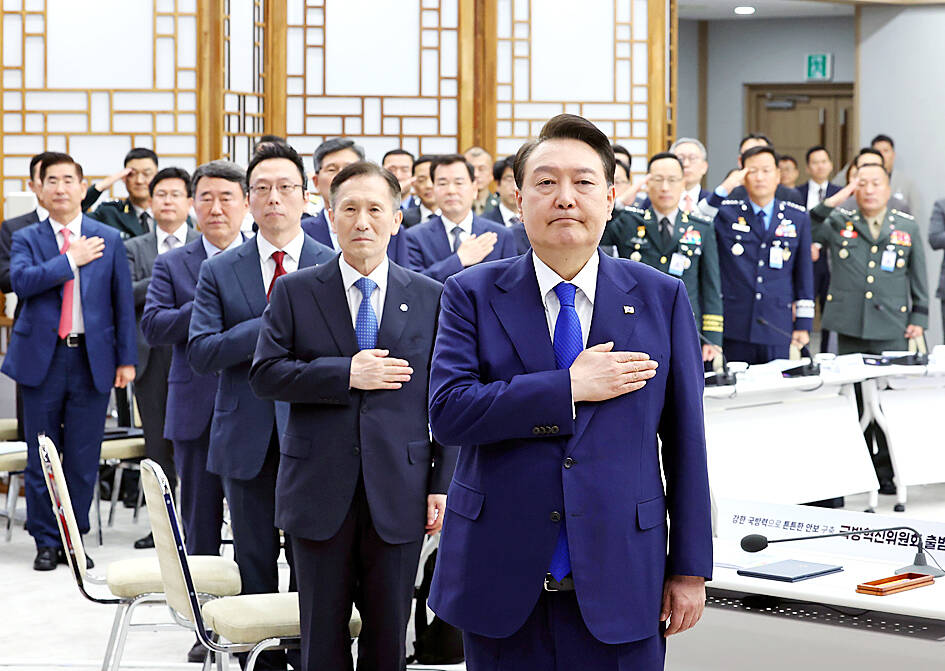A warming of ties between South Korea and Japan would help them share information with their US ally to keep an eye on North Korea, South Korean National Diplomatic Academy chancellor Park Cheol-hee said yesterday.
“We are advancing the issues of security cooperation, especially information sharing among the three countries,” said Park, who was a top adviser to Seoul as it drew up a deal to remedy an impasse that hurt security and trade ties.
Park told Bloomberg Television that the deal was a good starting point that would help the neighbors work on economic security issues and address concerns about global supply chains.

Photo: EPA-EFE
South Korean President Yoon Suk-yeol and Japanese Prime Minister Fumio Kishida this week struck a chord of unity at a summit where the US allies agreed to cooperate on North Korea. They also cemented a deal to compensate people forced to work at Japanese factories and mines during its 1910-1945 colonial rule over the Korean Peninsula.
The visit marked the first formal summit in Seoul in about a dozen years between the neighbors, helped by the deal Yoon unveiled in March that calls for South Korean firms to contribute to a compensation fund for workers conscripted during the occupation.
The payments were meant to avoid forcing Japanese companies to provide compensation, in line with Tokyo’s contention all such claims were settled under a 1965 agreement.
US President Joe Biden’s administration welcomed the move, calling it a “groundbreaking” deal, but Yoon has had trouble winning over the public at home, with surveys showing that most respondents were against the pact.
Park said the deal marked “an achievement by the two leaders and the United States facilitated it and encouraged it.”
The friction between Seoul and Tokyo caused headaches for the US as it sought help from its partners in securing global flows of key materials that were less dependent on China.
The Biden administration has also been seeking help from its partners to impose sweeping curbs on the sale of advanced chip equipment to China in a policy aimed at preventing the country’s progression in a range of cutting-edge technologies.
Kishida said his summit with Yoon helped him “deepen the relationship of trust,” as the two leaders hailed a resumption of shuttle diplomacy and cooperation on items such as semiconductors.
Park said the deal should help the partners address economic concerns posed by China.
“If we stand strongly together with the United States and Japan, we are in a much more comfortable position to deal with China,” Park said, adding that the South “Korean government is not against China. It’s our mission to re-embrace China in a favorable way.”

Kehinde Sanni spends his days smoothing out dents and repainting scratched bumpers in a modest autobody shop in Lagos. He has never left Nigeria, yet he speaks glowingly of Burkina Faso military leader Ibrahim Traore. “Nigeria needs someone like Ibrahim Traore of Burkina Faso. He is doing well for his country,” Sanni said. His admiration is shaped by a steady stream of viral videos, memes and social media posts — many misleading or outright false — portraying Traore as a fearless reformer who defied Western powers and reclaimed his country’s dignity. The Burkinabe strongman swept into power following a coup in September 2022

A new online voting system aimed at boosting turnout among the Philippines’ millions of overseas workers ahead of Monday’s mid-term elections has been marked by confusion and fears of disenfranchisement. Thousands of overseas Filipino workers have already cast their ballots in the race dominated by a bitter feud between President Ferdinand Marcos Jr and his impeached vice president, Sara Duterte. While official turnout figures are not yet publicly available, data from the Philippine Commission on Elections (COMELEC) showed that at least 134,000 of the 1.22 million registered overseas voters have signed up for the new online system, which opened on April 13. However,

‘FRAGMENTING’: British politics have for a long time been dominated by the Labor Party and the Tories, but polls suggest that Reform now poses a significant challenge Hard-right upstarts Reform UK snatched a parliamentary seat from British Prime Minister Keir Starmer’s Labor Party yesterday in local elections that dealt a blow to the UK’s two establishment parties. Reform, led by anti-immigrant firebrand Nigel Farage, won the by-election in Runcorn and Helsby in northwest England by just six votes, as it picked up gains in other localities, including one mayoralty. The group’s strong showing continues momentum it built up at last year’s general election and appears to confirm a trend that the UK is entering an era of multi-party politics. “For the movement, for the party it’s a very, very big

ENTERTAINMENT: Rio officials have a history of organizing massive concerts on Copacabana Beach, with Madonna’s show drawing about 1.6 million fans last year Lady Gaga on Saturday night gave a free concert in front of 2 million fans who poured onto Copacabana Beach in Rio de Janeiro for the biggest show of her career. “Tonight, we’re making history... Thank you for making history with me,” Lady Gaga told a screaming crowd. The Mother Monster, as she is known, started the show at about 10:10pm local time with her 2011 song Bloody Mary. Cries of joy rose from the tightly packed fans who sang and danced shoulder-to-shoulder on the vast stretch of sand. Concert organizers said 2.1 million people attended the show. Lady Gaga